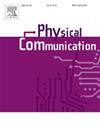DRL-based resource allocation for max–min fairness in V2V network
IF 2.2
4区 计算机科学
Q3 ENGINEERING, ELECTRICAL & ELECTRONIC
引用次数: 0
Abstract
As vehicle-to-everything (V2X) standards continue to develop, ensuring both high throughput and fair resource allocation for safety-critical vehicle-to-vehicle (V2V) data has become a pivotal challenge in vehicular network design. To address this issue, this study proposes a resource allocation scheme that incorporates fairness constraints into the joint optimization of spectrum and power, thereby enhancing overall system throughput while maintaining fairness among V2V links. To solve the multi-objective optimization problem in dynamic vehicular environments, a deep reinforcement learning (DRL)-based framework is developed, which introduces improvements in experience sampling and reward modeling to enhance the stability and convergence efficiency of the learning process. Simulation results demonstrate that the proposed algorithm not only achieves optimized aggregate system throughput but also significantly enhances the minimum V2V link rate. Compared to baseline methods, the algorithm exhibits superior adaptability across varying vehicle densities, further validating its practical efficacy in dynamic scenarios.
基于drl的V2V网络最大最小公平资源分配
随着车对车(V2X)标准的不断发展,确保对安全至关重要的车对车(V2V)数据的高吞吐量和公平资源分配已成为汽车网络设计中的关键挑战。为了解决这一问题,本研究提出了一种将公平性约束纳入频谱和功率联合优化的资源分配方案,从而在保持V2V链路间公平性的同时提高系统整体吞吐量。为了解决动态车辆环境下的多目标优化问题,提出了一种基于深度强化学习(DRL)的框架,该框架在经验采样和奖励建模方面进行了改进,以提高学习过程的稳定性和收敛效率。仿真结果表明,该算法不仅实现了最优的系统吞吐量,而且显著提高了最小V2V链路速率。与基线方法相比,该算法在不同车辆密度下表现出更强的适应性,进一步验证了其在动态场景下的实用性。
本文章由计算机程序翻译,如有差异,请以英文原文为准。
求助全文
约1分钟内获得全文
求助全文
来源期刊

Physical Communication
ENGINEERING, ELECTRICAL & ELECTRONICTELECO-TELECOMMUNICATIONS
CiteScore
5.00
自引率
9.10%
发文量
212
审稿时长
55 days
期刊介绍:
PHYCOM: Physical Communication is an international and archival journal providing complete coverage of all topics of interest to those involved in all aspects of physical layer communications. Theoretical research contributions presenting new techniques, concepts or analyses, applied contributions reporting on experiences and experiments, and tutorials are published.
Topics of interest include but are not limited to:
Physical layer issues of Wireless Local Area Networks, WiMAX, Wireless Mesh Networks, Sensor and Ad Hoc Networks, PCS Systems; Radio access protocols and algorithms for the physical layer; Spread Spectrum Communications; Channel Modeling; Detection and Estimation; Modulation and Coding; Multiplexing and Carrier Techniques; Broadband Wireless Communications; Wireless Personal Communications; Multi-user Detection; Signal Separation and Interference rejection: Multimedia Communications over Wireless; DSP Applications to Wireless Systems; Experimental and Prototype Results; Multiple Access Techniques; Space-time Processing; Synchronization Techniques; Error Control Techniques; Cryptography; Software Radios; Tracking; Resource Allocation and Inference Management; Multi-rate and Multi-carrier Communications; Cross layer Design and Optimization; Propagation and Channel Characterization; OFDM Systems; MIMO Systems; Ultra-Wideband Communications; Cognitive Radio System Architectures; Platforms and Hardware Implementations for the Support of Cognitive, Radio Systems; Cognitive Radio Resource Management and Dynamic Spectrum Sharing.
 求助内容:
求助内容: 应助结果提醒方式:
应助结果提醒方式:


